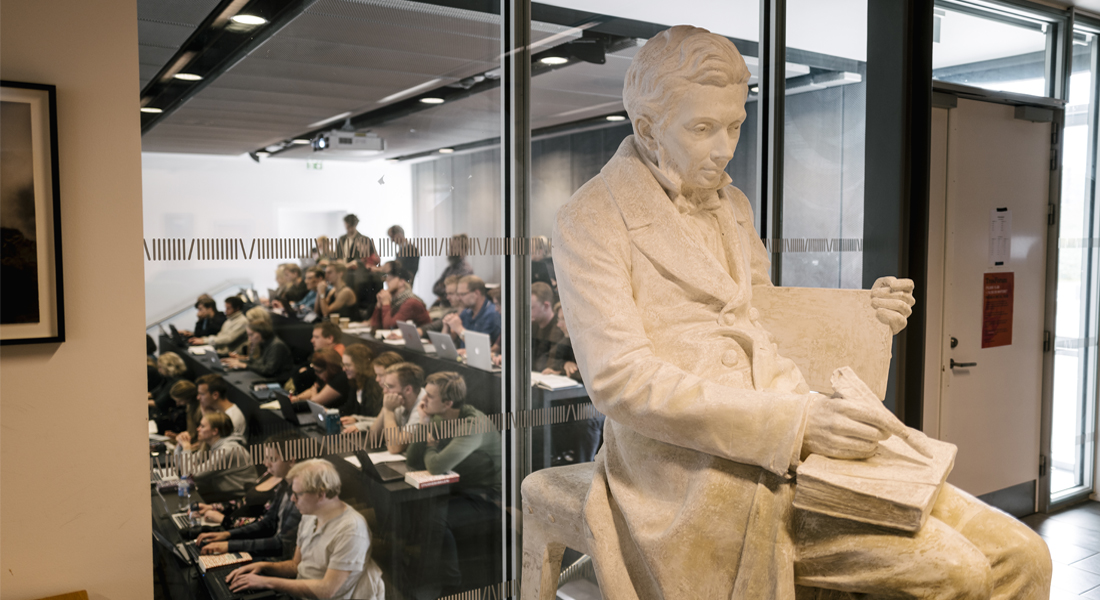Søren Kierkegaard: The Individual Between the Religious and the Secular
The Faculty of Theology will not be hosting a summer course in 2025
Previous Summer Course, July 2024
Credits: 15 ECTS

Once again, the Faculty of Theology is pleased to offer a course on the thought of Søren Kierkegaard in his hometown and at his own university. In this concentrated summer course, you will study alongside students from Denmark as well as countries throughout the world.
This course serves two purposes: First, it offers a general survey of the thought of Denmark’s most globally famous philosopher and Christian theologian, Søren Kierkegaard (1813–1855); second, it specifically assays Kierkegaard’s interrogation of becoming an individual in the dynamics between the religious and the secular.
Kierkegaard’s authorship centers on the existential project of becoming oneself. According to Kierkegaard, this is a difficult ethical and religious task that presents itself to every human individual—and at the same time, it is a task that demands the individual challenge their preconceptions about the content and limits of both morality and religiosity. In brief, Kierkegaard’s interpretation of Christianity requires that the individual confront and develop a new relationship to their own religiosity, in addition to what is ethically required of them.
In this course, students will engage with several of Kierkegaard’s major works in order to formulate answers to the following questions:
- What are the goals and structure of Kierkegaard’s existential project, and how does it hang together?
- How does Kierkegaard conceive the relationship between significant conceptual dyads, including: religious/secular, Christian/non-Christian, theology/philosophy, faith/reason, Christendom/‘Paganism,’ and sacred/ordinary history?
- How can Kierkegaard’s thinking be deployed in philosophical, ethical, and political discussions of today, and to what extent do Kierkegaard’s thoroughgoing Christian commitments generate challenges for applying his thinking outside of specifically Christian contexts and communities.
Every week, there will be an afternoon excursion into the heart of Kierkegaard’s Copenhagen. We will visit some of Kierkegaard’s most beloved locations in Copenhagen, where we will do onsite readings and discuss the central dimensions of his thought.
In general, class will take the form of a lecture followed by a dialogue between instructor and the students. Readings will be assigned for each class and the discussions will focus on these readings. Additionally, there will be a weekly afternoon excursion. Instruction will be in English, and we will refer to English translations of Kierkegaard during class, but you are welcome to read and consult translations in your native language.
Computer policy: No surfing or texting during class.
This course is open to second, third and fourth year undergraduate students as well as first year graduate students. You must have completed 60 ECTS points before the summer course begins. The course aims at students interested in philosophy, theology, literature and social sciences, though all disciplines are welcome; a background in philosophy is not required.
The assessment is based on two parts:
Course participation: Active class attendance (75% attendance). Active course participation is a prerequisite for writing the exam paper.
Undergraduate requirements: Familiarity with a reading list (primary and secondary literature) of 1,200 - 1,500 pages. A written paper of 24,000 – 28,800 characters approx. 10-12 pages (formally, 2400 characters per page, including spaces), based on 600-800 pages of primary literature. The paper can be written in English or any Scandinavian language.
Master requirements: Familiarity with a reading list (primary and secondary literature) of 1,200 - 1,500 pages. A written paper of 36,000 – 48,000 characters approx. 15-20 pages (formally, 2400 characters per page, including spaces), based on 800-1,000 pages of primary literature. The paper can be written in English or any Scandinavian language.
Assessment: Danish 7-point grading scale and ECTS letter grading scale.
Final Paper due at 12 noon on 15 August.
Application Deadlines
- 1 April 2024 for applicants who wish to be invited to book housing through the Housing Foundation.
- 1 June 2024 for all other applicants.
Application and tuition fees
Application deadline is 1 April
Applicants from a Danish university or Danish citizens can apply up until 1 June
Read about application, tuition fees and accommodation here.
Contact: international@teol.ku.dk
Venue
Room 6B-0-22
Faculty of Theology, Karen Blixens Plads 16, 2300 Copenhagen S, Denmark.
